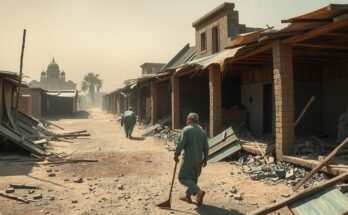The Canada Feminist Forum opposes the Taliban’s participation in COP29, citing their severe human rights violations and lack of legitimacy. They argue that this invitation undermines the UN’s values and further enables the Taliban’s oppressive regime. This has sparked a debate on the legitimacy of unrecognized regimes in global forums and the need for meaningful representation of the Afghan people.
The Canada Feminist Forum for Afghanistan vehemently opposes the Taliban’s invitation to participate in COP29, the climate change conference taking place in Baku, Azerbaijan. In a poignant open letter to the UN, they criticized this invitation as a blatant oversight of the Taliban’s egregious human rights record, emphasizing that the group has failed to display any commitment to Afghanistan’s national interests or global climate cooperation. Describing the Taliban’s governance as nothing short of draconian, the forum highlighted the cruel restrictions on women and girls, branding these actions as a form of gender apartheid. The letter articulated concerns about the Taliban’s unrecognized status as a governing authority, emphasizing that their human rights violations are a fundamental aspect of their rule, and they have shown no accountability to the Afghan populace or to international standards of governance. Additionally, the letter accused the Taliban of exploiting the humanitarian crisis they largely instigated to further their militant objectives and oppress the very people they claim to govern. Despite this backlash, the Taliban, led by Matiul Haq Khalis of their Environmental Protection Agency, attended COP29, which is said to be their first venture into a significant international climate forum. This situation has sparked a deeper discussion on the presence of unrecognized regimes within international platforms. Critics warn that the Taliban’s participation may inadvertently grant legitimacy to their regime, despite their persistent and severe human rights abuses. As the UN remains silent on these concerns, activists persist in their demands for authentic representation and accountability for Afghanistan’s beleaguered citizens, particularly women and girls, in the global dialogue on climate and human rights.
The invitation extended to the Taliban for COP29 represents a complex interplay of international relations and human rights advocacy. Following the Taliban’s takeover of Afghanistan, their governance has been marked by significant restrictions on civil liberties, particularly targeting women and minority groups. The Canadian Feminist Forum’s response underscores a larger, ongoing debate about the appropriateness of allowing such regimes to engage in global discussions, particularly on issues like climate change, where ethical governance and human rights are critical to effective action.
The backlash against the Taliban’s invitation to COP29 illuminates the precarious balance between climate action and the promotion of human rights. As nations assess the ramifications of legitimizing unrecognized regimes, it becomes apparent that ensuring accountability and representation in international forums is vital. The call for the inclusion of Afghan citizens, especially marginalized groups like women and girls, resonates as a necessary step toward a just global dialogue on both climate and human rights.
Original Source: amu.tv



